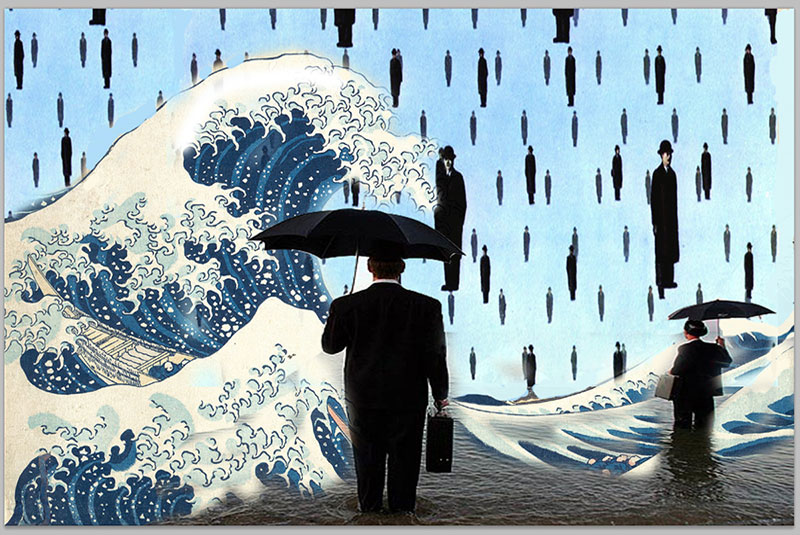
On Sunday, Dec. 26, 2004, I was quietly sitting in my hotel in Phuket, Thailand, having a leisurely breakfast on a gorgeous morning, after having jogged a 20-km training run.
I decided to go for a walk on the beach before checking to see if my kids were awake, and on the way out of the dining area I spotted a guy with chicken curry on his plate. I adore chicken curry and had not seen that among the buffet options. So, at the last moment, and fresh from a long run, I decided to have another serving of breakfast and indulge in the chicken curry.
This simple, innocuous, unimportant decision saved my life.
My kids didn’t become orphans, all because of chicken curry.
Because 30 seconds after getting my curry and sitting down, and before the first bite, the 2004 tsunami, and the first of six waves of devastation, hit the beach in Phuket. And because I was sitting in the breakfast area some 200 meters away, and was not on the beach, I had time to drop everything and sprint up the stairs to safety. The 48 people from our hotel who were on the beach already were not so lucky. They all perished in the tsunami.
It was a gorgeous holiday — Boxing Day — so we were surrounded by families on vacation. It was a time of joy and the skies were clear and sunny. Who would have thought a wave of death would soon engulf us all?
This is the tsunami principle in life. Sometimes, when we least expect it, we get hit very hard by a wave that changes everything. We don’t see it coming. We have no warning. But it comes. And life is never the same afterwards.
Tsunamis strike every single one of us in every part of our lives. I recall now, three decades ago, sleeping peacefully in the middle of the night, with my infant son also fast asleep beside me. Around 3 a.m. the phone rang. I jumped up to answer it, downright angry someone was calling so late and fearing my baby would awaken and cry. Expecting some sort of crank caller, I grabbed the phone and barked rudely, “What?” into the mouthpiece. It wasn’t a crank call. It was my sister. And she was crying. She told me my father had died.
At that moment, the tsunami hit me head on. I was devastated. And life would never be the same.
We can’t outrun the tsunamis in our life. We are all going to be hit by them and there is no getting around this painful reality. The deaths of loved ones are tsunamis. Breakups can be tsunamis. Business crises that appear out of nowhere can be tsunamis. Fires and natural disasters can be tsunamis. And yes, tsunamis themselves can be tsunamis. There is no avoiding them. We are all going to take our share of tsunami strikes in our lifetimes.
But we can’t beat our heads against a wall, wondering, “What should I have done differently?” Nobody could have foreseen the tsunami striking Phuket the day after Christmas 2004. Nobody could predict the day my father’s heart stopped. There is no use beating ourselves up about tsunamis in life. You don’t know. And we are never going to know. This is life.
So, if you can’t prevent a tsunami in life, then how do we handle them when they hit us?
Well, there are proven strategies to handling tsunamis — when the proverbial “s**t hits the fan” and you get knocked off balance by events in your life.
• Head to high ground. High ground is where you are safe. You feel comforted. In Phuket, my high ground was climbing a belltower with my family. When my father died, my high ground was surrounding myself with family and close friends for support. When I endured a myriad of business tsunamis, often it was the gym or a run on the streets that had a calming effect. For some it is church. Or a vacation. The point is, this is personal. When a tsunami hits you in life, head for the high ground — the places, people and situations that give you comfort and safety.
• Ride it out. The bad thing about tsunamis is they are fierce and hardhitting and painful to endure. The good news is they end quickly. It’s easy to say “hold on,” but often in tsunamis there is nothing actually to hold on to and one just has to ride it out. The interesting thing is, the law of “unintended consequences” can often come into play. Sometimes the tsunami grabs you and takes you for a hard ride, but by sticking it out, maybe it ends up dropping you in a new location that actually ends up being a blessing in disguise.
Nobody illustrates this better than Apple founder Steve Jobs in his famous speech at Stanford University in 2005. In this speech, Jobs explained one of the great tsunamis in his life was being fired from Apple in 1985, the company he founded! He was lost. Devastated. But he ended up going on to other roles: he founded Pixar, which is now the leading animated film studio in the world, and also founded NeXt, which was later bought by Apple. And through NeXt, Jobs returned to Apple as CEO and led it to becoming the world’s most valuable company in terms of market capitalization. Jobs clearly states that he would never have enjoyed the success he brought to Apple had he not experienced the tsunami of being fired and going off and learning at Pixar and NeXt.
Tsunamis are a part of life. It’s not a question of avoiding them; we can’t. But we can control how we react to them and this is all-important. Head to the high ground where you feel comfortable and secure. Ride the wave out and hang on. You will make it through. And you just may find you thrive more in the new place you end up in.
